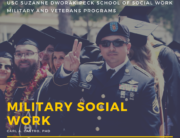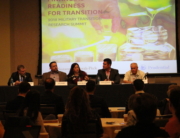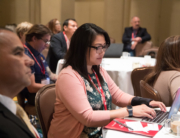Because of medical advances, this generation of post-9/11 veterans is now surviving injuries once considered fatal and returning to communities that may be ill-prepared to care for them.
A recent summit convened by the Gary Sinise Foundation and the USC School of Social Work’s Center for Innovation and Research on Veterans and Military Families brought together a diverse set of experts in physical, psychological and community needs to discuss the challenges faced by severely wounded warriors and their caregivers.
Held at the University of Southern California, about 60 attendees at the “Closing the Gap” summit aimed to identify gaps in care and work toward solutions to better support these veterans, who experienced such severe trauma as limb amputations, severe burns and traumatic brain injury.
The summit also stressed not to overlook military families, who often become primary caregivers and whose work often goes unnoticed.
The summit will release a report of its findings and next steps.
Actor Gary Sinise—well known for his “Forrest Gump” role as Lt. Dan Taylor, a Vietnam veteran who loses both legs in combat—has been a passionate supporter of veterans and military families for decades. His foundation helps fund initiatives that support all veterans, especially wounded warriors and their caregivers.
At the summit, Sinise said he hoped that Lt. Dan’s story arc could be replicated for this population of veterans.
“At the end of the movie, he is standing up on new legs, successful and moving forward with his new life. We want that same happy ending for all our veterans,” he said.
CIR director Anthony Hassan, who moderated a morning panel, said that the moral obligation to ensure veterans and their families are cared for is shared by the military, VA and community. He encouraged attendees to be proactive in their discussions and come up with practical solutions and next steps.
“It’s easy to preach,” he said. “But it takes leadership to do something about it.”








